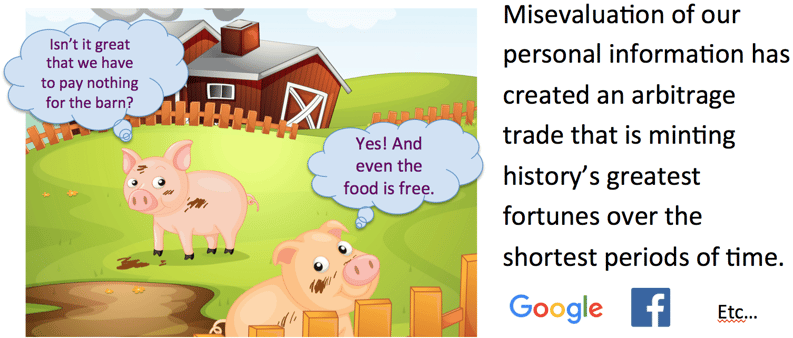Every billionaire on the planet under the age of 25 or 30 built their respective empires by making the same trade. The trade is risk-free, the spread between prices are wide, and there is so much liquidity that they are able to trade in enormous volume without skewing markets higher. The trade is so profitable and such a sure bet they will give stuff away for "free" just to bring others to the table.
Free email, data storage, social media accounts - it's all "free", in exchange for your privacy and personal information, that is. It is the price imbalance, the disconnect between the common level of understanding of the value intrinsic to our privacy and personal information that is creating some of the largest fortunes in history over very short periods of time. Facebook, Google, Twitter, AOL, Yahoo, ... they are all information companies, and the information that makes them so valuable and their founders worth billions, is yours.
The Trade That Hacked Our Democracy
An example of a "free" value proposition of an Internet business model includes email providers in the U.S., like Gmail, AOL, and Yahoo. Their approach to trading services for personal information generates far more profit by lifting information from customers' email accounts and reselling it to the highest bidder than by charging a nominal monthly fee to deliver a proper email service. It's similar to the U.S Post Office giving stamps away for free, in exchange for the right to open your envelopes and packages, and keeping whatever they find. For the consumer, it's a losing trade every time, but in ways that may not be obvious or immediately experienced.
Over the last 20 years email has been subverted to an open door for governments, corporations, criminals and anyone else to invade our privacy, security and personal safety.
We know Google can and does scan and store everything every Gmail user does on their email platform, and clearly the NSA does too. Between the two, most of us are under full-time surveillance, both commercially and personally, and algorithms are constantly trying to predict, manipulate, alter and exploit our future. But, what we have to accept, and manage, is the fact that so are very sophisticated criminal syndicates from around the world. All of their resources as criminal organizations are being deployed toward the best risk/reward equation they've seen in the history of their business, and email is at the center of it all.

Click here for more on why cyber-crime will be intensifying dramatically in the immediate future: http://blog.totaldigitalsecurity.com/cyber-crime
It's not a stretch to say our privacy, security and personal safety are under attack every day. Very sophisticated technology is being used to watch, track, record, collect, sift, sort and predict almost every aspect of our lives. The threats are growing at exponential rates and we are increasing our vulnerability regularly by the increased adoption of technology in more and more aspects of our lives. The IoT (Internet of Things) will exacerbate it all and clearly without preventative measures, we are entering a long period of not "if" something will happen, but "when" will it happen and how bad it will be when it does.
http://en.wikipedia.org/wiki/Internet_of_Things
Now, for the good news. There are very effective tools available that substantially mitigate all of your online risks and they are highly affordable. To find out what we do specifically for email, check us out here: "How To Privatize Your Email Account and Take Back Control of Your Personal Information."
How to privatize your email with a private, highly secure email domain from Total Digital Security:





